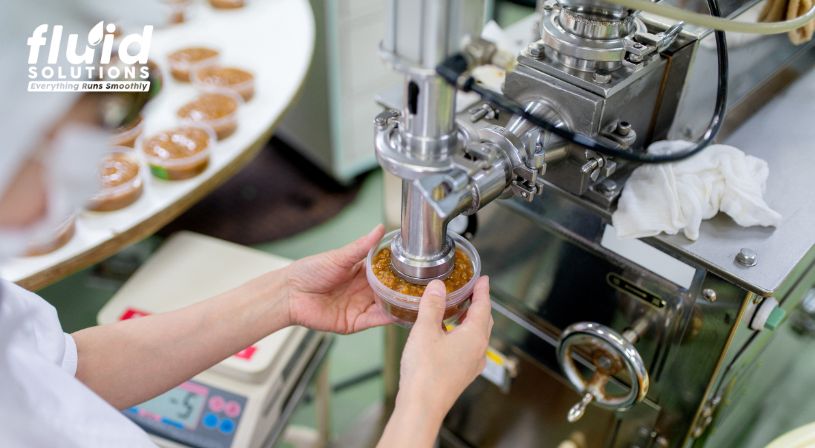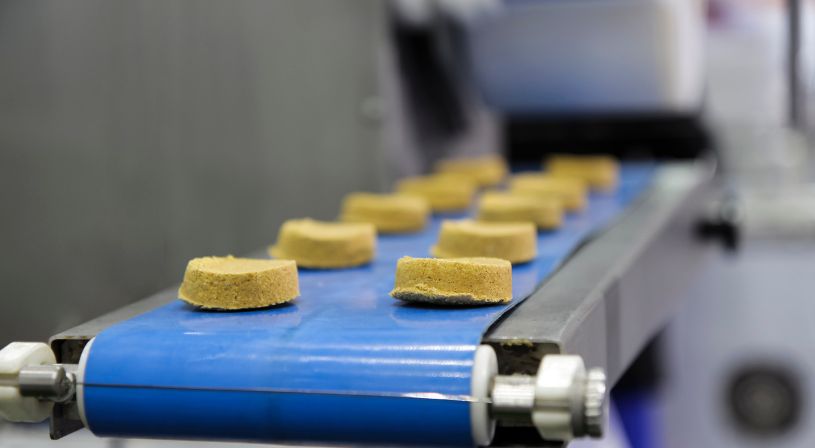
Machinery in the food and beverage industry needs lubricants to operate smoothly. Food processing particularly requires using food industry lubricants, which are specifically formulated to prevent contamination of food products.
Contamination of food and beverages can have severe consequences for both consumers and manufacturers. Food-grade lubricants mitigate these risks by being safe for incidental contact with food in case of a spill or leak. Moreover, the National Sanitation Foundation (NSF) provides a framework for food-grade lubricants, ensuring they meet strict regulatory standards.
In general, food-grade lubricants are certified lubricants that meet strict regulatory standards and are formulated with non-toxic, odorless, and tasteless ingredients to prevent food contamination
Understanding Food-Grade Lubricants
Food-grade vs. non-food-grade lubricants
As a standard, a lubricant is food-grade if it meets the following criteria:
- Regulatory Compliance: Compliance with standards set by organizations such as the NSF and registration categories like H1 or ISO 21469 certification. Non-food-grade lubricants do not require this level of compliance.
- Ingredients: Food-grade lubricants are made from limited approved ingredients under the U.S. FDA’s Code of Federal Regulations Title 21 Section 178.3570 or 21 CFR.
- Formulation: Grease for food processing equipment should be odorless, colorless, and tasteless. Non-food-grade lubricants do not have these strict purity requirements.

Regulatory standards and certifications
U.S. Food and Drug Administration (FDA)
The FDA oversees food safety in the United States, and part of its responsibility is to ensure that food products (including those processed using lubricants) are safe for consumption. The FDA monitors compliance with safety standards and certifies facilities and products through various programs, such as the Accredited Third-Party Certification Program. This program allows accredited organizations, like NSF , to conduct audits and issue certifications that confirm compliance with food safety regulations.
National Sanitation Foundation (NSF)
NSF is an independent organization that develops standards and provides certification for food safety, water quality, and consumer goods. This body also certifies products and processes to ensure they meet safety and quality standards. NSF certifications are recognized globally, and help manufacturers demonstrate compliance with FDA regulations.
Moreover, NSF categorizes food-grade lubricants based on the likelihood of food contact:
| Classification | Characteristics |
| NSF H1 | Non-toxic, tasteless, and odorless lubricants that are safe for incidental food contact, with a 10-ppm limit in food. These are often used in machinery like pumps, conveyors, and mixers as well as blending, brewing, and bottling. |
| NSF H2 | These lubricants are not intended for food contact areas, but suitable for use in food facilities where no contact is possible. Though food-grade, these lubricants are usually considered not food-safe. |
| NSF 3H | These are direct contact release agents for food processing equipment that are often applied to molds, grills, and other equipment to keep food from sticking to the machinery. Incidental direct contact with this lubricant may occur, but not directly on food. |
Characteristics of food-grade lubricants
Non-toxicity
Food processing lubricants are non-toxic to prevent contamination of food products. Manufacturers ensure non-toxicity by selecting ingredients that are approved for food contact, such as synthetic oils, white mineral oils, and vegetable-based oils.
Odorless and tasteless
Food industry lubricants are odorless and tasteless to avoid altering the sensory properties of food products. Any detectable taste or smell can lead to consumer dissatisfaction and potential safety concerns. Manufacturers achieve these properties by carefully selecting and formulating base oils and additives that do not impart any flavor or aroma.
High performance
Food processing lubricants perform effectively in high temperatures, pressures, and exposure to cleaning chemicals. They are designed to provide reliable lubrication and protection against wear and tear in food processing equipment. In many cases, advanced food-grade lubricants, particularly those with synthetic bases, can outperform traditional non-food-grade lubricants in terms of stability and longevity.
Resistance to degradation
Food-grade lubricants are resistant to degradation from heat, moisture, and cleaning agents, ensuring stability in food processing environments where conditions can significantly vary. Lubricants in the food industry include additives that provide better resistance to oxidation, contributing to a longer shelf life. This also reduces the need for frequent replacements and maintenance.
Components of Food-Grade Lubricants
Base oils
Food-grade lubricants typically use two main types of base oils: mineral oils and synthetic oils. Mineral oils are refined from petroleum, while synthetic oils are chemically engineered to provide superior performance. The purity of these base oils is critical to compliance, as high-quality refinement processes remove impurities that could lead to contamination. This ensures that the lubricants are safe for incidental contact with food and maintain their effectiveness under various operating conditions.
Additives
Additives like anti-wear agents, antioxidants, and corrosion inhibitors enhance the performance of food-grade lubricants and extend their lifespan. These additives must be food-safe and non-toxic, ensuring they do not compromise food safety.
Thickeners
Thickeners provide the necessary consistency and stability for effective lubrication. Additionally, they help maintain the lubricant’s structure and prevent separation, ensuring that it adheres well to surfaces and provides reliable performance. Thickeners in food-grade lubricants must not only enhance effectiveness but also prevent contamination and ensure safety in case of incidental food contact.
Applications Of Food-Grade Lubricants
Common uses in food processing
Food-grade lubricants are commonly used for the lubrication of machinery and equipment involved in the food and beverage industry. They are also essential for maintaining conveyor belts and other moving parts, where incidental contact with food products may occur.
Benefits in beverage manufacturing
Food-grade lubricants also play a crucial role in the beverage manufacturing industry. They are used to lubricate equipment and machinery involved in the production, packaging, and handling of beverages, ensuring that the final product remains uncontaminated.
Ensure Food Safety with Top-Quality Food-Grade Lubricants from Fluid Solutions
Ensure food safety with top-quality food-grade lubricating oils and greases in the Philippines from Fluid Solutions. Our expert team is ready to assist you in selecting the right lubricant tailored to your specific needs, ensuring compliance with industry standards, and enhancing operational efficiency.
Do not compromise on safety—contact us today for expert advice and product inquiries. Reach us at (02) 8370 5928 / (0917) 894 9156 or email inquiry@fluidsolutions.com.ph.
Social Media Links:
Facebook Page: https://www.facebook.com/fluidsolutionsinc
LinkedIn: https://www.linkedin.com/company/fluid-solutions-inc


